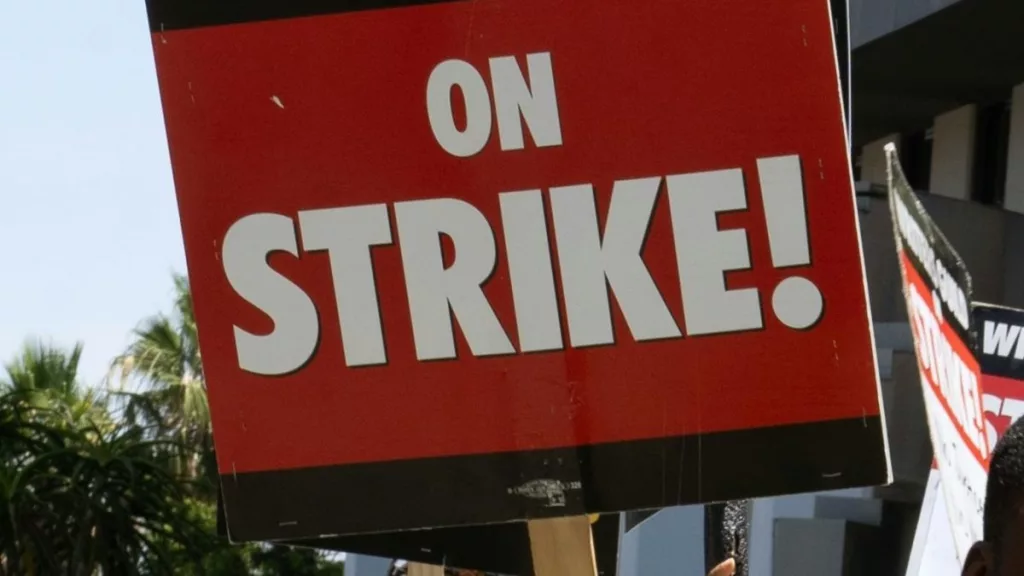OLYMPIA, WA – Depending on who you ask, Engrossed Senate Bill 5041 – signed into law by Gov. Bob Ferguson earlier this week – is either a much-needed social safety net for workers and their families or something that will incentivize and prolong strikes and imperil Washington state’s Unemployment Insurance Trust Fund.
ESB 5041 extends unemployment insurance benefits to striking or locked-out workers in Washington. Depending on the strike date, benefits would start 15 to 21 days after the strike begins. If the contract is resolved before that time, no benefits would be issued. Per the bill, striking workers would be able to access unemployment benefits for up to six weeks.
Sen. Marcus Riccelli, D-Spokane, is the sponsor of the bill.
“Striking is a last resort, and this bill will help level the playing field for workers trying to exercise their right to collectively bargain for fair wages and safe workplace conditions,” he said at Monday’s bill-signing ceremony. “Affordability is one of the top issues for people in my district. This legislation will help make sure people who do important jobs and important work have fair pay, good benefits, and safe work conditions.”
Joe Kendo, chief of staff for the Seattle-based Washington State Labor Council, approves of the new law, which goes into effect in January
“The WSLC supported and actively worked on 5041 – we were very pleased with its passage,” he emailed The Center Square. “When workers are provoked to strike, it is only ever as a last resort, and often as a response to obstinate employer behavior. We are hopeful that there will be fewer strikes as a result of improved employer collaboration at the table if they know that workers are less likely to have to risk economic ruin to strike.”
He went on to say he hopes the new law will change employers’ behavior in a way that positively impacts workers.
“This is a particularly important dynamic for lower-wage workers whose employers know are less able to sustain a strike of any length, much less a prolonged one,” Kendo explained. “Knowing that there are UI benefits available to support these workers will, we hope, create an incentive for employers to act differently in their labor relationships.”
Not everyone agrees with his assessment.
“SB 5041 would insert the state into private labor negotiations, tilting the balance in favor of unions and incentivizing longer, more frequent strikes,” House Republicans said on their “Stop Bad Bills” website examining newly passed bills.
Patrick Connor, Washington state director for the National Federation of Independent Business, shared that sentiment.
“Moreover, granting unemployment benefits to striking workers effectively subsidizes work stoppages,” he said in an email. “This, coupled with a union’s own strike fund, incentivizes prolonged strikes. Government tipping the balance in a labor dispute in this way can only harm the struck employer and local small businesses unwittingly caught up in the controversy.”
Kendo pushed back on the notion that the new law would motivate workers to strike.
“While UI benefits will be helpful for those workers who do go on strike, those benefits are not full wage replacement, so I do not believe that it would incentivize strikes,” he said.
Elizabeth New, director of the Center for Workers Rights at the Washington Policy Center think tank, said the new law gives employers another reason not to do business in Washington and could result in fewer available jobs. More frequent strikes, she said, could also mean lower pay or layoffs for some workers.
She also noted that public strikes are prohibited. That means people who are paid from the UI fund and eventually paid by an employer – as happens in teacher strikes – could result in an overpayment that the state can recoup.
“There’s only so much money to go around,” New said.
Again, Kendo pushed back.
“As a fiscal matter, 5041 will have a negligible – if any – impact on the UI trust fund,” he said in his email. “ESD estimated something like $1.4m in increased benefits for months during which a qualifying strike occurs. That $1.4m is out of an approximate $120m monthly total benefit average.”
He continued: “With respect to rates, the Legislature designed the bill to contain costs to the specific employer, so there will be no generalized rate impact for employers who do not experience strikes. Due to the structure of UI rates, these costs will be isolated.”
According to a 2024 Employment Security Department report, Washington’s UI Trust Fund has a balance of just under $4 billion and a little more than eight months of benefits available.
The fiscal note for ESB 5041 estimates that those approved for benefits would receive an average weekly benefit of $757 in fiscal year 2026. Payments would be determined by their employer’s experience rate.
ESD will present an annual study to the Legislature to report on the prevalence of strikes within Washington and their impact on the state’s UI Trust Fund.





